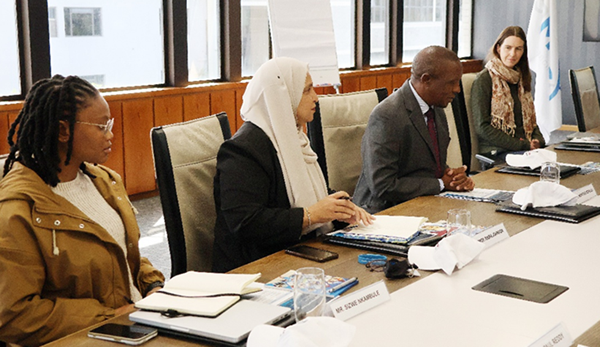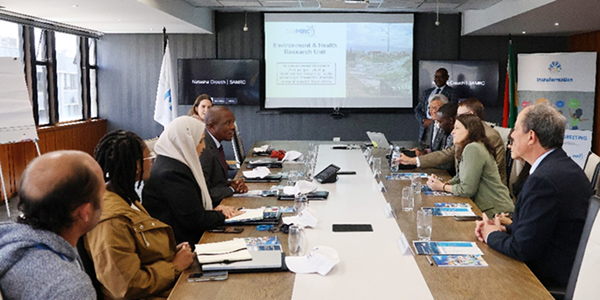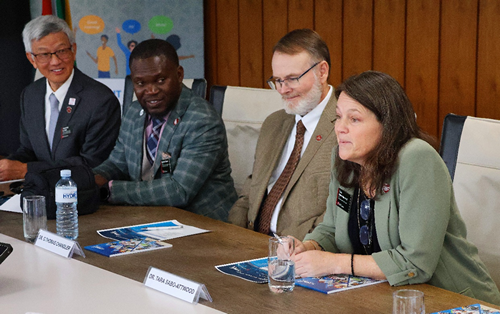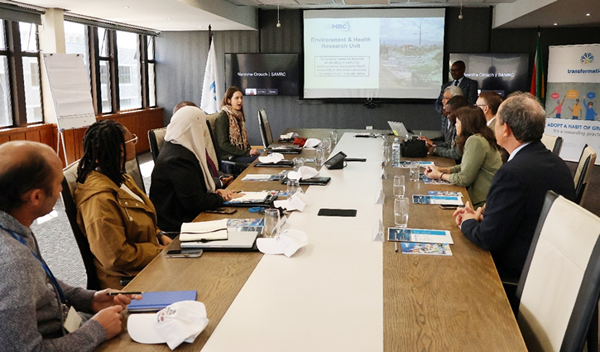South African Medical Research Council Hosts University of South Carolina Delegation: Advancing Research, Capacity Building, and Global Health Partnerships

The South African Medical Research Council (SAMRC) recently hosted a high-level delegation from the University of South Carolina (USC), reinforcing a dynamic partnership that is driving innovation, research capacity development, and impactful health science in South Africa and beyond. The meeting, hosted by Dr Mongezi Mdhluli, Chief Research Operations Officer, and chaired by Dr Frederic Nduhirabandi, Programme Manager for RCD Grants/Career Awards, brought together leading researchers, including directors and scientists from the Environment and Health Research Unit, Biomedical Research and Innovation Platform, and the Pan-African Centre for Epidemics Research (PACER) and the USC experts, to discuss potential opportunities and collaborations related to wastewater research and monitoring.
The USC delegation included experts in public health, big data, HIV, and infectious diseases: Prof Tara Sabo-Attwood, Dean of the Arnold School of Public Health, Professor in Environmental Quality and Global Health, and a leading expert in environmental toxicology and public health; Prof G Thomas Chandler, former Dean and Professor of Environmental Health Sciences; Prof Sharon Beth Weissman, infectious disease specialist and Chair of the Department of Medicine; Prof Xiaoming Li, an expert in clinical research and health promotion; Prof Bankole Olatosi, specialising in health services and policy; and Mr David Paul Reddy, a research facilitator in computing and data systems.
Building on a Foundation of Collaboration
Dr Mdhluli, who led the SAMRC delegation, opened the meeting by welcoming the USC team and providing historical context for SAMRC's mission and structure. He emphasised SAMRC's dual mandate to conduct and fund research addressing South Africa's quadruple burden of disease—communicable and non-communicable diseases, maternal and child health, and violence and injury. He also highlighted the Council's commitment to supporting the Department of Health and building a healthy nation through both intramural and extramural research units, as well as the importance of partnerships in building a healthier nation. These remarks set the tone of excitement and ambition for the engagement.
Research Capacity Development and Academic Exchange
A central highlight was the Boloka Project, a flagship collaboration between PACER and USC, funded through SAMRC's Research Capacity Development Programme under the Mid-Career Scientist Programme. Since its inception in 2022, this partnership has focused on harnessing big data on HIV to inform sustainable and equitable responses. Through USC's support, PACER staff and postgraduate students have attended major Big Data Health Science Conferences, presenting research and engaging with global experts. These efforts have resulted in five oral and twelve poster presentations published in BMC Proceedings, as well as the successful completion of eight PhD theses, with several students set to graduate soon. The meeting also celebrated ongoing co-authored publications and joint conference presentations, underscoring the tangible academic and professional development outcomes of the collaboration.

Innovation in Wastewater Surveillance and Public Health
As part of the core discussion, the SAMRC team presented the Wastewater Surveillance and Research Programme, a flagship initiative launched in 2020 at the height of the COVID-19 pandemic. Prof Renée Street, Director of the Environment and Health Research Unit, described how the programme evolved from COVID-19 monitoring into a broader platform now tracking cholera, influenza, measles, and antimicrobial resistance. Prof Rabia Johnson, Director of the Biomedical Research and Innovation Platform, highlighted the advanced molecular and mass spectrometry technologies for a rapid detection of pathogens, as well as the integration of genomics, AI, and public-facing data tools. Their presentation emphasised the programme's expansion, including its current activity across six universities and the establishment of a national early warning system for detecting pathogens in wastewater. They also highlighted the programme's contribution to pandemic preparedness, climate resilience, and environmental health, while noting challenges such as data harmonisation, ethics, and sustainable funding. In the context of SAMRC strengthening research capability, Dr Mdhluli also mentioned the establishment of the new SAMRC Thermo Fisher Centre. This state-of-the-art research facility will accelerate high-throughput analysis, innovation, and training for scientists across South Africa, particularly those based in under-resourced institutions. The centre will be instrumental in pandemic preparedness and in strengthening Africa's research infrastructure.

The USC delegation, led by Prof Tara Say-Watwood, Dean of the Arnold School of Public Health, showcased the university's expertise in environmental toxicology, infectious disease surveillance, and big data science. They highlighted the Boloka Project, a collaboration with the SAMRC's Pan-African Centre for Epidemic Research (PACER), which utilises big data to enhance HIV responses. USC's Big Data Health Science Centre has played a pivotal role in data sharing, capacity building, and supporting early-career scientists, while also expressing a strong interest in expanding joint efforts in wastewater-based epidemiology and resilience research.

Data, Ethics, and Stakeholder Engagement
Following the presentations by both delegations, the participant discussed the complexities of data sharing, ethical considerations, and stakeholder engagement. Lessons learned from the pandemic included the importance of public-facing dashboards, multilingual communication, and the challenge of aligning environmental surveillance with clinical data. The collaborative approach to knowledge translation and stakeholder communication was highlighted as a key success factor. In this context, participants further discussed translating science into policy and action, stressing the importance of stakeholder engagement, ethical frameworks, and accessible communication. Both sides expressed interest in forming a partnership to scale up pathogen monitoring, expand AI applications, and leverage new funding opportunities for collaborative research.

Closing Remarks and Future Directions
In his closing remarks, Dr Mongezi Mdhluli thanked all participants for their commitment and collaborative spirit. He stressed the importance of sustaining these partnerships, stating, "Our collective efforts are vital for advancing science and improving public health outcomes not only in South Africa but globally. Let us continue to work together, share knowledge, and support one another as we address the challenges and opportunities ahead."
The meeting concluded with a renewed commitment from both SAMRC and USC to expand their partnership, drive innovation, and continue supporting postgraduate and early-career researchers. This collaboration serves as a model for international scientific cooperation, capacity building, and impactful health research, yielding direct benefits for South African communities and advancing global health.
